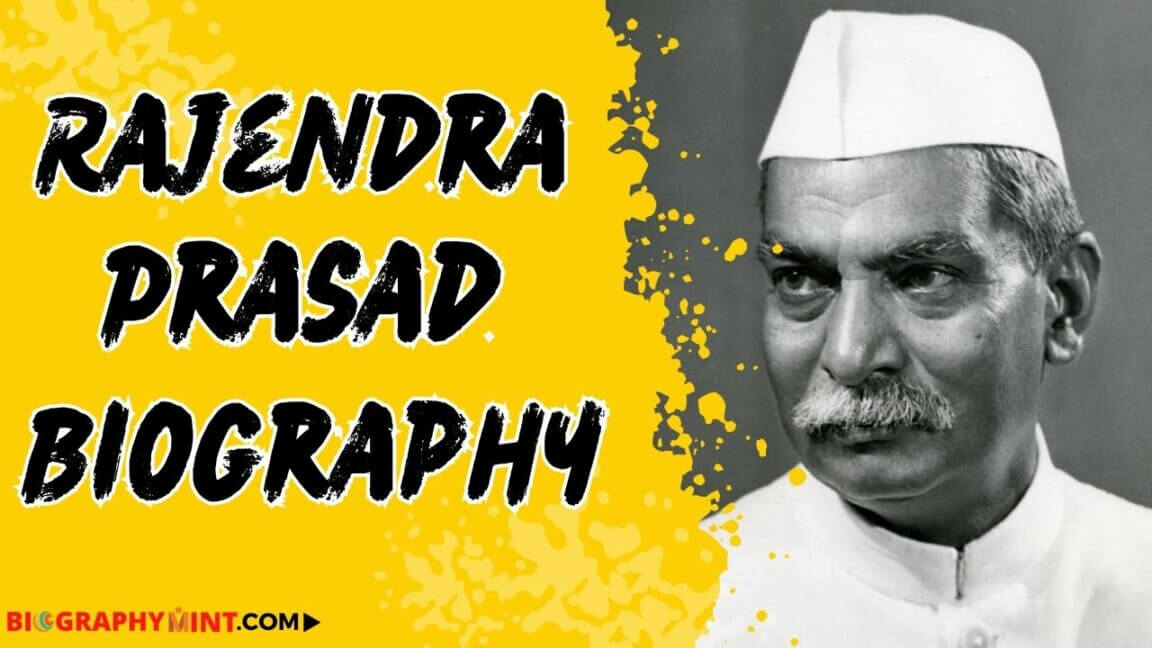Introduction
Rajendra Prasad, a pivotal figure in India’s history, embodies the essence of selfless service and unwavering dedication to the nation. His remarkable journey from a humble background to becoming the first President of independent India is a testament to his indomitable spirit and leadership. In this article, we will delve into the life and legacy of this statesman, exploring his contributions to shaping modern India.
Join us as we unravel the layers of Rajendra Prasad’s life, from his formative years and pivotal role in the independence movement to his enduring impact on Indian society. Discover the values that guided him through challenges and learn about the remarkable honors he received for his exemplary service. Get ready to be inspired by a man whose vision and actions continue to resonate with generations, leaving an indelible mark on the fabric of our nation.
Early Life and Education
Dr. Rajendra Prasad, born on December 3, 1884, in Zeradei, Bihar, came from a modest agricultural family. Despite humble beginnings, young Rajendra displayed exceptional intellect and determination from a tender age, drawing inspiration from his parents’ emphasis on education as the key to a brighter future.
His thirst for knowledge led him to pursue higher education at prestigious institutions like the University of Calcutta and the University of Allahabad. At the young age of 22, Rajendra Prasad earned his Masters in Law degree with flying colors, showcasing his academic prowess and dedication to continual learning.
Rajendra’s unwavering commitment to education saw him delve into various subjects beyond law, including history, political science, and philosophy. This diverse academic background not only broadened his intellectual horizons but also equipped him with a comprehensive understanding of societal dynamics that would later shape his leadership style.
Driven by an insatiable curiosity and a deep-rooted desire to contribute meaningfully to society, Rajendra Prasad’s formative years were marked by an intense focus on personal growth and self-improvement. His educational journey laid a solid foundation for the remarkable achievements he would go on to accomplish in the realms of politics and public service.
Political Journey Begins
Entering politics, Rajendra Prasad’s journey began in the early 1920s when he actively participated in the Indian National Movement led by Mahatma Gandhi. His commitment to the cause of Indian independence and his leadership qualities quickly gained recognition within the political circles of the time.
Prasad’s involvement with the Indian National Congress deepened as he continued to work tirelessly for social and political reforms in India. His astute understanding of the needs of the masses and his unwavering dedication to serving his country set him apart as a rising political figure destined for great leadership roles.
As Prasad’s influence within the Congress party grew, he emerged as a key figure in shaping policies and strategies aimed at challenging British colonial rule. His eloquent speeches, strategic planning, and ability to mobilize support from all sections of society played a crucial role in garnering momentum for India’s freedom struggle.
Rajendra Prasad’s political journey was marked by integrity, resilience, and a deep sense of duty towards his nation. His unwavering belief in non-violence as a tool for social change and his commitment to inclusive governance endeared him to both colleagues and constituents alike. This phase laid the foundation for his future roles as a statesman and visionary leader.
Role in India’s Independence Movement
Rajendra Prasad played a pivotal role in India’s independence movement by actively participating in various movements and protests against British colonial rule. He was a staunch supporter of Mahatma Gandhi’s principles of non-violence and civil disobedience, leading by example through his actions and speeches.
Prasad was instrumental in organizing civil disobedience campaigns, boycotts of foreign goods, and peaceful protests to challenge British authority. His unwavering dedication to the cause inspired countless others to join the fight for freedom, creating a unified front against colonial oppression.
As a prominent leader of the Indian National Congress, Prasad worked tirelessly to mobilize support for the independence movement across different regions of India. His strategic acumen and diplomatic skills were crucial in negotiating with British officials and garnering international support for India’s cause on the global stage.
Despite facing numerous challenges and setbacks during the struggle for independence, Rajendra Prasad remained resolute in his commitment to achieving freedom for his countrymen. His unwavering determination and vision for a free India served as a beacon of hope for millions who yearned for self-rule and dignity.
Becoming the First President of India
After India gained independence in 1947, Rajendra Prasad’s impeccable leadership qualities led to his unanimous election as the first President of the Republic of India on January 26, 1950. His humility, wisdom, and unwavering commitment to serving the nation made him a revered figure among his peers and the public alike.
As President, Rajendra Prasad played a pivotal role in shaping the newly formed nation’s constitutional framework. His deep understanding of law and governance guided him in navigating the complexities of establishing a democratic system that would reflect India’s rich diversity while upholding its unity. He approached his duties with grace and dignity, setting high standards for future leaders.
Rajendra Prasad’s presidency was marked by his emphasis on unity and inclusivity. He firmly believed in fostering harmony among different communities and regions to build a strong, cohesive nation. Through his speeches and actions, he promoted tolerance, respect for diversity, and the importance of working together towards common goals, inspiring citizens to embrace their shared identity as Indians above all else.
Despite facing numerous challenges during his tenure as President, including managing post-independence transitions and socio-economic issues, Rajendra Prasad remained steadfast in his dedication to serving the people of India with integrity and compassion. His visionary leadership laid a solid foundation for India’s growth as a democratic republic committed to upholding justice, equality, and freedom for all its citizens.
Legacy and Contributions
Enduring Impact on Indian Politics: Rajendra Prasad’s legacy in Indian politics is profound. As the first President of India, he set a high standard for leadership and integrity. His commitment to upholding democratic principles and fostering unity among diverse communities continues to inspire political leaders today.
Promotion of Education: One of Prasad’s significant contributions was his emphasis on education as a means of social and economic empowerment. He advocated for accessible education for all, believing that knowledge was the key to progress. His efforts in promoting literacy and educational institutions have had a lasting impact on Indian society.
Advocate for Social Justice: Throughout his career, Prasad championed social justice and equality for all citizens. He was a vocal supporter of the rights of marginalized communities, working towards creating a more inclusive society. His unwavering dedication to uplifting the downtrodden has left an indelible mark on India’s quest for social harmony.
Promotion of Gandhian Principles: Inspired by Mahatma Gandhi, Rajendra Prasad actively promoted Gandhian principles such as non-violence, truthfulness, and simplicity. His adherence to these values not only shaped his personal conduct but also influenced his approach to governance. By embodying these ideals, he instilled hope and optimism in the hearts of many Indians during challenging times.
Personal Life and Values
Rajendra Prasad was a man of great integrity, known for his simple living and high thinking. Despite holding prestigious positions, he maintained a humble lifestyle and always put the needs of others before his own. His selfless nature and compassionate demeanor endeared him to all who crossed his path.
Family was paramount to Rajendra Prasad, and he cherished the time spent with his loved ones. He believed in the importance of strong family bonds and made sure to prioritize quality time with his wife, children, and extended family members. This aspect of his life not only brought him joy but also grounded him amidst the chaos of political life.
Values such as honesty, hard work, and dedication were ingrained in Rajendra Prasad’s character from a young age. He believed in leading by example and never hesitated to roll up his sleeves and work alongside those under him. His ethical principles served as a guiding light in both his personal and professional endeavors.
Rajendra Prasad’s commitment to service extended beyond his official duties; he often engaged in charitable activities and philanthropic endeavors. His belief in giving back to society stemmed from a deep sense of gratitude for all that he had achieved in life. This altruistic spirit endeared him even more to the people he served.
Challenges Faced and Overcome
Political Opposition: Rajendra Prasad faced significant challenges from political opponents who disagreed with his ideologies and leadership style. Despite facing criticism and resistance, Prasad remained steadfast in his convictions, navigating through turbulent political waters with resilience and grace.
Administrative Pressure: As the first President of India, Prasad encountered immense administrative pressure in shaping the newly independent nation. Juggling multiple responsibilities and expectations, he displayed remarkable organizational skills and a calm demeanor, overcoming bureaucratic hurdles with strategic decision-making.
Social Unrest: During his tenure, Prasad had to address various social unrest issues plaguing the country. With a compassionate approach and a commitment to unity, he worked tirelessly to bridge cultural divides and promote harmony among diverse communities, eventually quelling tensions through dialogue and diplomacy.
Health Setbacks: Despite facing health setbacks during his presidency, Rajendra Prasad demonstrated remarkable strength and perseverance in fulfilling his duties. His resilience in overcoming physical challenges inspired many across the nation, showcasing that determination and dedication can triumph over adversity in any circumstance.
Impact on Indian Society
Rajendra Prasad’s impact on Indian society was profound and far-reaching. As the first President of independent India, he set a strong example of ethical leadership and integrity. His dedication to serving the people inspired a sense of national pride and unity among citizens from all walks of life.
Prasad’s emphasis on education as a tool for social upliftment led to the establishment of several educational institutions that are still thriving today. His focus on empowering women through education helped break down societal barriers and paved the way for gender equality in Indian society.
Furthermore, Rajendra Prasad’s commitment to promoting communal harmony and religious tolerance fostered a culture of respect and understanding among diverse communities in India. His efforts to bridge cultural divides and promote unity served as a beacon of hope during times of social turmoil.
Overall, Rajendra Prasad’s impact on Indian society can be seen in the values of integrity, inclusivity, and progress that continue to shape the nation today. His legacy serves as a reminder that positive change is possible through individual actions guided by compassion and a steadfast commitment to the greater good.
Honors and Recognitions
Awarded the Bharat Ratna: In recognition of his exemplary service to the nation, Rajendra Prasad was honored with the Bharat Ratna, India’s highest civilian award. This prestigious accolade symbolizes his significant contributions to the country’s progress and his unwavering dedication to upholding its values.
Mahatma Gandhi’s Praise: Revered leader Mahatma Gandhi himself commended Prasad for his unwavering commitment to truth, non-violence, and social harmony. Gandhi saw in Prasad a steadfast ally in the pursuit of independence and nation-building, highlighting Prasad’s integrity and moral character.
International Recognition: Rajendra Prasad’s statesmanship garnered international acclaim, with world leaders admiring his diplomatic skills and vision for a progressive India. His ability to foster positive relations on the global stage earned him respect and admiration from prominent figures worldwide.
Distinguished Academic Honors: Beyond politics, Prasad was also recognized for his scholarly pursuits. His profound knowledge of law and dedication to education led to numerous academic accolades, showcasing his intellectual prowess alongside his political achievements. His multidimensional excellence left an indelible mark on various facets of society.
Conclusion
As we conclude our exploration of the remarkable life of Rajendra Prasad, it becomes evident that his unwavering dedication to serving the people of India and upholding democratic values has left an indelible mark on the nation’s history. His relentless pursuit of social justice and commitment to fostering unity among diverse communities serve as a beacon of inspiration for future generations. Through his exemplary leadership and selfless actions, Prasad demonstrated that with integrity, perseverance, and compassion, one can truly make a lasting impact on society.
FAQ
What were some of Rajendra Prasad’s key accomplishments during his tenure as the President of India?
Rajendra Prasad’s presidency was marked by his dedication to upholding the Indian Constitution and promoting unity among the diverse population. He prioritized education, agriculture, and social welfare, working towards a progressive society. His emphasis on ethical governance and inclusivity set a high standard for future leaders.
How did Rajendra Prasad navigate the challenges he faced during his political career?
Rajendra Prasad’s resilience and unwavering commitment to his principles guided him through turbulent times. He tackled obstacles with grace, relying on diplomacy and dialogue to resolve conflicts. His ability to stay true to his values while adapting to changing circumstances earned him respect from both allies and adversaries.
What was Rajendra Prasad’s impact on Indian society beyond politics?
Beyond his political role, Rajendra Prasad was a champion of social justice and equality. He advocated for women’s rights, education for all, and rural development initiatives. His philanthropic endeavors inspired many individuals to contribute towards nation-building efforts and fostered a culture of giving back to the community.
How can we draw inspiration from Rajendra Prasad’s life today?
Rajendra Prasad’s journey exemplifies the power of integrity, perseverance, and compassion in leadership. By embracing diversity, upholding democratic values, and prioritizing the welfare of all citizens, we can honor his legacy in our own actions. Let us strive to emulate his spirit of service towards creating a more harmonious society for future generations.






GIPHY App Key not set. Please check settings